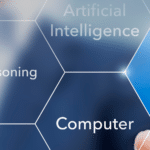Our Machine Learning News section covers all informations gathered around the World on Commerce (or Retail) oriented Artificial Intelligence.

What our Machine Learning News are about?
We mainly cover anything we’re interested in, as long as it speaks about Artificial Intelligence and Retail: IBM Watson, Amazon Machine Learning, Product Content, Demand Management.
Get updated with Machine Learning News by registering to our newsletter
You can register on Mash’n Learn contact page anytime.
What is our definition of Machine Learning at Mash’n Learn
Machine learning is a subfield of computer science that evolved from the study of pattern recognition and computational learning theory in artificial intelligence. In 1959, Arthur Samuel defined machine learning as a “Field of study that gives computers the ability to learn without being explicitly programmed”. Machine learning explores the study and construction of algorithms that can learn from and make predictions on data. Such algorithms operate by building a model from example inputs in order to make data-driven predictions or decisions, rather than following strictly static program instructions.
Machine learning is closely related to (and often overlaps with) computational statistics; a discipline which also focuses in prediction-making through the use of computers. It has strong ties to mathematical optimization, which delivers methods, theory and application domains to the field. Machine learning is employed in a range of computing tasks where designing and programming explicit algorithms is unfeasible. Example applications include spam filtering, optical character recognition (OCR), search engines and computer vision. Machine learning is sometimes conflated with data mining, where the latter subfield focuses more on exploratory data analysis and is known as unsupervised learning.
Within the field of data analytics, machine learning is a method used to devise complex models and algorithms that lend themselves to prediction – in commercial use, this is known as predictive analytics. These analytical models allow researchers, data scientists, engineers, and analysts to “produce reliable, repeatable decisions and results” and uncover “hidden insights” through learning from historical relationships and trends in the data.
